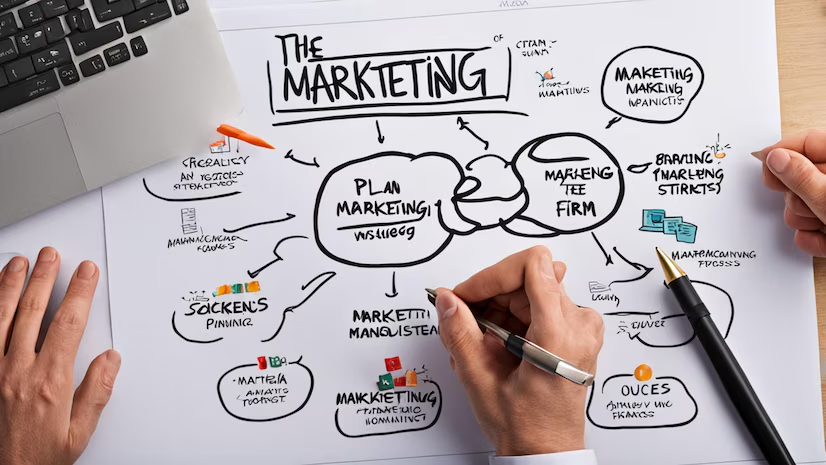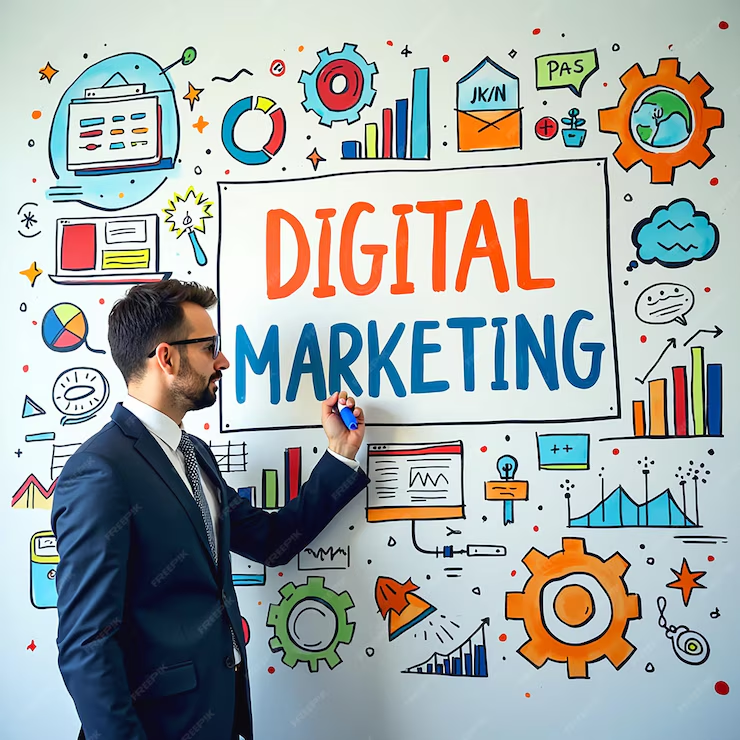What is Digital Marketing?
1. Why marketing is important
A set of processes or activities that work to discover customer desires and develop a set of products or services that satisfy their desires

Why in this day and age marketing is more important:
Online Audience: Many people live their daily lives online, so digital presence is vital to reaching an audience.
Changes in consumer behavior: Shopping habits have changed with the development of technology, and consumers tend to search online and shop via electronic platforms.
Cost-effectiveness: Digital marketing can be more cost-effective than traditional marketing, allowing businesses to reach a wide audience at a lower cost.
3- Types of marketing
Lorem ipsum dolor sit amet, consectetur adipiscing elit. Ut elit tellus, luctus nec ullamcorper mattis, pulvinar dapibus leo.
Digital Marketing:
Digital advertising media are used, such as social media sites, online ads, and email, to communicate with the audience.
Traditional Marketing:
It includes the use of television and radio, print advertising such as newspapers and magazines, and personal marketing.
Content Marketing:
Focuses on creating and distributing content of value to the audience to attract attention and build long-term relationships.
Trade Marketing:
It targets companies and business customers, and includes business-to-business sales and marketing.
Sports Marketing:
It is associated with sports and its use in marketing products or brands.
Relationship marketing:
Focuses on building trust and loyalty relationships with customers.
Inbound Marketing:
It aims to motivate and motivate employees within the company to support marketing objectives.
Determining quality marketing depends on the industry, target objective, and branding strategies
Digital Marketing:
It is the use of digital advertising media and digital technology to market products or services. This includes using the Internet, social media, email, search engines, and online advertising to reach a target audience and achieve marketing goals. Digital marketing allows businesses to accurately measure the performance of their campaigns and better determine the effectiveness of ads

4-What is digital marketing?
Marketing via social media platforms:
Social media marketing is an essential part of modern marketing strategies. Here are five essential steps you can take to achieve social media marketing success
Define your goals:
Define your goals clearly. Do you want to increase brand awareness, improve engagement, or increase sales
Determine the target audience:
Understand who your target customers are. What demographic and interest features can help you reach them better
Choosing the right platforms:
Identify the social platforms your target audience mainly uses. For example, Facebook, Instagram, Twitter, LinkedIn, etc.
Develop engaging content:
Create valuable and engaging content that targets your audience. Use high-quality images and videos, and write texts that stimulate interaction.
Building interaction and engagement:
Interact with your followers, respond to their comments and messages. Share content with your followers and encourage them to participate.
Performance analysis and campaign tuning:
Use data analysis tools to measure the performance of your campaigns. Analyze following, number of clicks, and user engagement to adjust your strategy based on the data
Content Marketing:
Search Engine Marketing (SEM):
It is considered an important part of online marketing strategies. Here are five essential steps to achieving search engine marketing success
Choose keywords
Search for keywords related to your products or services. Use keyword research tools to identify relevant words that potential customers can use in search engines.
Setting up advertising campaigns:
Create advertising campaigns using search engine advertising platforms such as Google Ads. Choose the right keywords and add attractive and relevant search ads.
Determine the target audience:
Define the target audience precisely. You can specify geographic location, age group, and interests to ensure your ads reach the right audience.
Landing Pages optimization:
Complete the user experience by optimizing the landing pages that visitors are directed to after clicking on the ad. Within landing pages, information should be clear, attractive, and encourage a specific action, such as a purchase or subscription.
Yas and performance analysis:
Use analytics tools like Google Analytics to measure the performance of your campaigns. Analyze the number of clicks, click rate (CTR), and analyze visitor behavior on landing pages. Use this information to improve your future campaigns.
Optimize your offering strategy:
Continuously improve your offering strategy. Experiment with more keywords, compare different ad types, and adjust budget and timing for best performance.
Search engine marketing requires continuity and continuous improvement to ensure the best results. Continue to monitor and analyze the performance of your campaigns and adjust your strategies based on data and analytics.
Click marketing:
Click marketing refers to marketing strategies that rely on payment to get clicks on ads. Sometimes called “pay-per-click” or “pay-per-click (PPC)”. The goal is to only pay a fee when someone clicks on your ad. Here are some key steps to effectively implement a click-through marketing campaign
Marketing via emails:
Email marketing is one of the digital marketing strategies that relies on sending promotional or informational messages to a group of people via email. Here are some steps you can take to improve your email marketing campaign:
Building a strong customer database:
Collect email addresses from potential customers via your website or through other marketing campaigns.
Audience segmentation:
Divide your database into categories based on interests or demographics to identify targeted messages.
Use an attractive title:
Choose an email subject line that grabs attention and encourages the message to be opened.
Providing added value:
Within messaging, provide immediate value to recipients through exclusive offers or quality content.
Use effective design:
Make the design attractive and easy to read, and ensure good visual reproduction on various devices.
Use call to action:
Clearly define the next step you want the recipient to take, such as visiting the site, signing up for the newsletter, or making a purchase.
A/B test:
Run A/B tests on messages to determine which marketing elements work best.
Marketing via paid ads:
Paid advertising marketing is an essential part of a digital marketing strategy. Here are some steps you can take to improve your paid advertising campaign:
Goal setting:
Before launching an advertising campaign, clearly define your goals, whether they are to increase awareness, increase sales, or generate more inquiries.
Choosing the appropriate social networks and digital platforms:
Determine which platforms your target audience mainly uses, whether that’s on social media like Facebook and Instagram or via search engines like Google.
Audience targeting:
Accurately define target audience characteristics, such as demographics and interests, so ads reach the right audience.
Create effective ads:
Create eye-catching and engaging ads with effective images and text. Make messages clear and attractive to grab your audience’s attention.
Use keywords smartly:
If using search engine advertising, target keywords related to your products or services.
Determine an effective budget:
Determine an appropriate and effective advertising budget so that you achieve your goals without overspending.
Measure and analyze performance:
Use ad analytics tools to measure your campaign performance and understand how your audience interacts with ads.
Continuously improve the campaign:
Draw on data and analysis to periodically improve advertising strategies. Test ad components and improve them based on the results.
Targeting previous users:
Retarget previous visitors to your site with targeted ads to boost conversion chances.
Interaction with the audience:
Monitor comments and shares on ads and engage with the audience to enhance engagement and build relationships.
As part of an overall marketing strategy, paid advertising campaigns can help increase brand visibility and improve business results
Affiliate Marketing:
Affiliate marketing is a marketing model that relies on paying a commission to marketing partners (publishers) when they refer clients or make sales of products or services. Here are some important points about affiliate marketing
Marketing partners (publishers):
These can be bloggers, website owners, social media users, or anyone who can drive traffic to a product or service.
Commission programs:
Companies offer affiliate programs to marketing partners to enable them to receive unique marketing links that are used to track the traffic and sales brought in.
Commission and compensation:
Marketing partners are paid a commission when they trigger a specific action, such as clicking on a promotional link or making a purchase.
Motivation and rewards:
Programs can ensure additional motivation for marketing partners by offering additional rewards or contests.
Performance tracking:
A performance tracking system is crucial to affiliate marketing, as you must have a way to accurately track clicks, conversions, and calculate commissions.
Choosing the right products and services:
Choose products or services that fit your marketing partners’ audience and that can generate consumer interest and desire.
Providing marketing resources:
Provide effective marketing resources such as attractive images, advertising texts, and other marketing materials to help partners make their campaign more effective.
Building strong relationships:
Build good relationships with marketing partners, and be available to answer any queries and provide necessary support.

6-How can you make a marketing plan?
Analysis of the current situation:
Evaluate the market and industry you operate in.
Study the competition and identify strengths and weaknesses.
Goal setting:
Define your marketing goals clearly and measurably.
Identify the target audience and understand their needs.
Marketing strategy development:
Choose marketing methods that are appropriate for the goal and audience, such as digital marketing or traditional marketing.
Content Plan Development:
Create engaging and inspiring content that fits your goal and audience.
Determining the competitive advantage:
Determine what sets your products or services apart from competitors.
Budgeting:
Determine the budget available to you and channel it effectively.
Campaign Implementation Implement the plan and run your marketing campaigns
Measurement and analysis of results:
Use analytics tools to measure the performance of your campaigns and analyze data to make future decisions
Improved performance:
Draw lessons from the results and adjust the plan to improve future performance.
Continue to update your plan over time to adapt to changes in the market and customer needs
7-The importance of making a marketing plan
The marketing plan is a vital tool for any business, and it is of great importance, which can be summarized in the following points:
Setting goals:
A marketing plan helps clearly define marketing objectives, such as increasing market share or enhancing brand awareness.
Understanding the market:
The plan allows for analyzing the target market and understanding the needs and desires of customers, which helps in designing products or services that meet those needs.
Resource distribution:
It helps allocate financial and human resources effectively, which contributes to achieving the set goals in the best possible way.
Directing activities:
It acts as a guiding map for marketing activities, helping teams work in a coordinated and consistent manner
Performance measurement:
Provides criteria for measuring performance and evaluating results, making it easier to modify strategies if necessary
Competitiveness:
Enhances competitiveness by understanding the strengths and weaknesses of the competition and identifying effective strategies to outperform them.
Effective communication:
Contributes to improving communication with customers by identifying appropriate marketing messages and effective channels
In general, a marketing plan is essential to ensure business success and achieve sustainable growth in the market.
8-Digital marketing tools
Semrush:
It is a powerful tool in the field of digital marketing, and offers a range of services and features, including:
Keyword Research:
It helps to discover keywords targeted by competing sites.
Site Audit:
A comprehensive evaluation of the website’s performance in terms of SEO and other techniques.
Site Monitoring:
It allows monitoring changes at the site and content level.
Advertising Research:
Provide analysis of online advertising and more.
Competitor Analysis:
Providing deep insight into competitors’ strategies.Providing comprehensive reports and analyzes to measure the effectiveness of marketing campaigns
HubSpot:
It offers a set of tools that help companies implement marketing strategies and manage customer relationships. Here’s a look at some of the key tools it offers:
HubSpot Marketing Hub:
Provide tools to create and execute digital marketing campaigns, including inbound marketing, email, and performance analysis.
HubSpot Sales Hub:
Providing tools to improve sales processes, including managing customer communications and tracking sales team performance.
HubSpot Service Hub:
Provide tools to improve customer service and support, including a customer relationship management (CRM) system and tools to manage support tickets.
HubSpot CMS Hub:
A content management system allows businesses to easily create and manage websites.
HubSpot Operations Hub:
It helps in data integration and management of internal processes to improve company efficiency.
HubSpot App Marketplace:
An app store where users can find apps and extensions compatible with HubSpot to extend the functionality of the platform.
These tools allow businesses to comprehensively manage their marketing campaigns, sales processes, and improve customer experience. These tools can be useful for small and large businesses alike to improve their marketing, sales and customer service performance.
Google Analytics:
Here are some key aspects of Google Analytics:
Track visits:
Google Analytics allows you to monitor traffic to your site and provides details about individual visitors.
Analysis of traffic sources:
It shows the source that brought visitors to your site, such as search engines or social media.
Behavior analysis:
It provides details about how visitors interacted with the site’s pages, how long they spent on the site, and which pages they visited.
Conversion analysis:
You can set specific goals (such as purchases or subscriptions) and analyze how these goals are being achieved.
Target audience reports:
Displays information about the target audience in terms of age, gender, geographic location, and temporal analysis:
Facebook Audience Insights:
It is an analytics tool provided by Facebook to help understand the audiences and target groups on the Facebook platform. This tool is intended to help advertisers and people who manage Facebook pages identify and understand the events and interests of their target audiences.
You can use Audience Insights to get a lot of information about the demographics, interests and behaviors of users on Facebook. Information you can access includes:
Demographics:
Age, gender, emotional status, geographical location, education, income, etc.
Interests and activities:
The pages the audience follows, the events they participate in, and the activities they engage in.
Network Feasibility:
Information about the extent to which your target audience interacts with content on Facebook.
Devices used:
Information about the devices the public uses to access Facebook.
Marketing activities:
How audiences respond to ads and marketing content
Facebook Ads Manager App:
It is a dedicated application that allows advertisers to manage their advertising campaigns on the Facebook platform directly from smartphones. This app is used to set up and run ads on Facebook and manage their performance. Thanks to this app, users can
Create ad campaigns:
You can create new ads, define your target goal and target audience, and configure ad settings.
Performance monitoring:
The app allows you to track the performance of your ad campaigns, including the number of clicks, cost per click, and audience analytics.
Edit existing campaigns:
You can edit existing ad campaigns, change images, text, ad budgets and targeting.
Reply to comments:
It allows you to follow comments and interact with your audience directly from the app.
Budget control:
You can monitor the budget of your advertising campaigns and adjust it as needed.
Review reports:
You can access detailed reports on the performance of your advertising campaigns
9-Important tips about marketing
Digital marketing is an essential part of modern marketing strategies, and here are some important tips about digital marketing:
Understanding the target audience:
Define and understand your target audience well. Know their interests and needs so you can better target your marketing messages.
Improve user experience:
Make the user experience on the website or app easy and engaging. Built into valuable content and design that responds to all devices.
Benefit from quality content:
Provide valuable and engaging content that meets the needs of the audience. This can be through articles, photos, videos, and interactive content.
Use social media effectively:
Choose and be active in the social networks that are most frequently used by your audience. Make regular updates and interact with followers.
Investing in online advertising:
Use search ads and social media ads strategically to increase brand awareness and generate more traffic.
Data Analysis:
Rely on data analysis to understand the performance of marketing campaigns, and use this data to make informed decisions about optimizing future campaigns.
Interest in email marketing:
Build a strong customer database and send effective marketing emails to boost engagement and selling.
Optimize your site for search engines to improve its position in search results and increase organic traffic.
Video usage:
Video is an effective way to convey marketing messages. Create engaging and inspiring video content to grab attention.
Follow up on technological developments:
Being an ever-changing digital field, keep track of the latest technological developments and adopt modern technology to enhance marketing campaigns.
As part of an overall marketing strategy, these tips can help improve the performance of digital marketing campaigns and achieve business goals.
